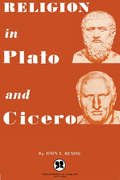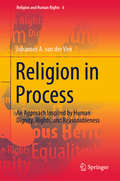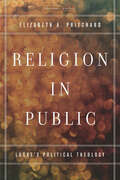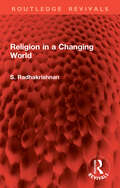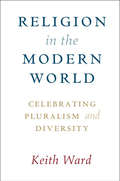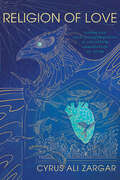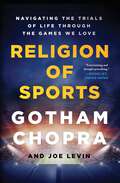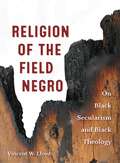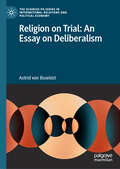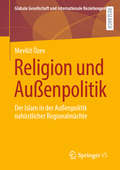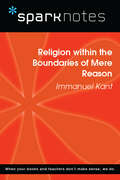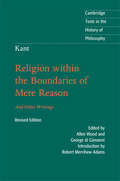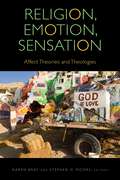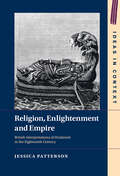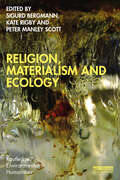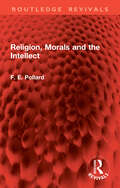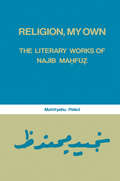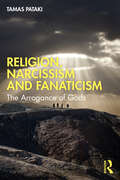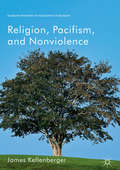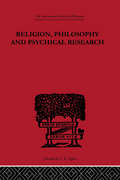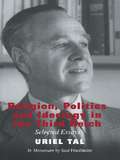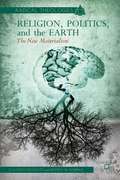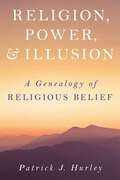- Table View
- List View
Religion in Plato and Cicero
by John E. RexineAuthor John E. Rexine expounds on the theologies of the great Roman thinkers Plato and Cicero in this essay. While both are more well known for their political philosophies, Rexine's astute analysis uncovers the religious views embedded in the most famous texts of these two visionaries. John E. Rexine was an author, theologian, and philosopher. He wrote extensively on philosophy, including Religion in Plato and Cicero, An Explorer of Realms of Art, Life, and Thought: A Survey of the Works of Philosopher and Theologian Constantine Cavarnos, and Hellenic Spirit: Byzantine and Post Byzantine.
Religion in Process: An Approach Inspired by Human Dignity, Rights, and Reasonableness (Religion and Human Rights #6)
by Johannes A. van der VenThis book argues that contemporary Christianity is in crisis because freedom of religion is concealed and under pressure by secularization and migration. A drastic change is necessary - in the Catholic Church at first - from a God-given hierarchical structure to a democratic religion that rests on human dignity and human rights.The text conveys that such a change -that should happen from within- will put an end to challenges such as in Catholicism where outside human rights are promoted, but from inside a different story is told. Cultural change in religion is also covered with the move from centuries-old dictates to the reasonable justification of freedom of experiences, symbols, rituals and inter-religious intercourse as well as the cross communication between believers and non-believers alike. This approach makes religion an as yet unfinished religion. The text appeals to researchers and academics working in human rights and religion.
Religion in Public: Locke's Political Theology
by Elizabeth A. PritchardJohn Locke's theory of toleration is generally seen as advocating the privatization of religion. This interpretation has become conventional wisdom: secularization is widely understood as entailing the privatization of religion, and the separation of religion from power. This book turns that conventional wisdom on its head and argues that Locke secularizes religion, that is, makes it worldly, public, and political. In the name of diverse citizenship, Locke reconstructs religion as persuasion, speech, and fashion. He insists on a consensus that human rights are sacred insofar as humans are the creatures, and thus, the property of God. Drawing on a range of sources beyond Locke's own writings, Pritchard portrays the secular not as religion's separation from power, but rather as its affiliation with subtler, and sometimes insidious, forms of power. As a result, she captures the range of anxieties and conflicts attending religion's secularization: denunciations of promiscuous bodies freed from patriarchal religious and political formations, correlations between secular religion and colonialist education and conversion efforts, and more recently, condemnations of the coercive and injurious force of unrestricted religious speech.
Religion in a Changing World (Routledge Revivals)
by S. RadhakrishnanIn Religion in a Changing World (originally published in 1967), Professor Radhakrishnan sets forth his reflections on the religion of the future which would make for the development of a world community. The author, who devoted a lifetime to the study of the religious problems of the East and West, evaluates the anti-metaphysical bias of our scientific age and interprets this outlook in positive rather than in negative terms, not as a loss of the sense of the spiritual but as a gain of the wholeness of experience. This book is written with deep religious feeling and will offer comfort to the bewildered generation, for it affirms the doubts and insecurities of modern man and points beyond them to the grounds for hope. It appreciates the intellectual difficulties of belief and gives the widest social context to religion.
Religion in the Modern World: Celebrating Pluralism and Diversity
by Keith WardThe subject of religious diversity is of growing significance, with its associated problems of religious pluralism and inter-faith dialogue. Moreover, since the European Enlightenment, religions have had to face new, existential challenges. Is there a future for religions? How will they have to change? Can they co-exist peacefully? In this book, Keith Ward brings new insights to these questions. Applying historical and philosophical approaches, he explores how we can establish truth among so many diverse religions. He explains how religions have evolved over time and how they are reacting to the challenges posed by new scientific and moral beliefs. A celebration of the diversity in the world's religions, Ward's timely book also deals with the possibility and necessity of religious tolerance and co-existence.
Religion of Love: Sufism and Self-Transformation in the Poetic Imagination of ʿAṭṭār (SUNY series in Islam)
by Cyrus Ali ZargarA groundbreaking study of Farid al-Din ʿAṭṭār, one of Persian literature's greatest poets.Religion of Love explores the life and work of the Persian Sufi poet and sage Farīd al-Dīn ʿAṭṭār. ʿAṭṭār changed the face of world literature, leaving his impact on all cultures that have valued Persian Sufi writings. Considered for the first time through the lens of religious studies, ʿAṭṭār's oeuvre offers much to contemporary readers. ʿAṭṭār's poems cast a light on the relationship between revelation and the intellect. They also encourage liberation from self-centeredness through the fiery path of love. Thus, Religion of Love considers one of Persian literature's greatest poets as more than just a poet, but also as a thinker and a commentator on moral psychology, ethics, and the intellectual debates of his age, debates that shed light on today's religious complexities.
Religion of Sports: Navigating the Trials of Life Through the Games We Love
by Gotham Chopra Joe LevinFrom the acclaimed director who has gone behind the scenes with many of the greatest athletes in the world, a memoir-meets-manifesto featuring never-before-heard stories about Tom Brady, Simone Biles, Kobe Bryant, Serena Williams, and many more. Sports is religion. No, really. From pilgrimages and cathedrals, gods and fallen angels, holy wars and holy ghosts, sports has every aspect of an organized faith. In fact, it might be even better: all it takes to believe is to stand and cheer. Nobody knows this better than the preeminent sports documentarian Gotham Chopra, who just so happens to be the son of world-renowned spiritualist Deepak Chopra. While his father taught him to find faith through prayer, Gotham felt pulled towards the Boston Garden and Larry Bird instead. Tracing his unique path from being a diehard fan to witnessing miracles alongside the gods of sport, Gotham makes a compelling case for sports as a modern-day faith. And like any worthy religious text, he also doles out wisdom, which comes in the form of never-before-heard stories about some of the biggest names in sports. Rarely has anyone had such an up-close view of greatness as Chopra, and now, he lets you come with him behind the scenes to learn how legendary quarterback Tom Brady managed the end of his career, gold medal gymnast Simone Biles struggled with the pressure of the Tokyo Olympics, Golden State Warriors sharpshooter Stephen Curry developed the greatest three-point shot of all time, and much more. Chopra weaves together stories from Kobe Bryant, Alex Morgan, LeBron James, Michael Strahan, Shaun White, and more into modern-day parables that unlock secrets of competition—and of life. Passionate and inspiring, the Religion of Sports is not just for diehard sports fans, but for anyone who&’s ever believed in something greater than themselves.
Religion of the Field Negro: On Black Secularism and Black Theology
by Vincent W. LloydBlack theology has lost its direction. To reclaim its original power and to advance racial justice struggles today black theology must fully embrace blackness and theology. But multiculturalism and religious pluralism have boxed in black theology, forcing it to speak in terms dictated by a power structure founded on white supremacy. In Religion of the Field Negro, Vincent W. Lloyd advances and develops black theology immodestly, privileging the perspective of African Americans and employing a distinctively theological analysis.As Lloyd argues, secularism is entangled with the disciplining impulses of modernity, with neoliberal economics, and with Western imperialism – but it also contaminates and castrates black theology. Inspired by critics of secularism in other fields, Religion of the Field Negro probes the subtle ways in which religion is excluded and managed in black culture. Using Barack Obama, Huey Newton, and Steve Biko as case studies, it shows how the criticism of secularism is the prerequisite of all criticism, and it shows how criticism and grassroots organizing must go hand in hand. But scholars of secularism too often ignore race, and scholars of race too often ignore secularism. Scholars of black theology too often ignore the theoretical insights of secular black studies scholars, and race theorists too often ignore the critical insights of religious thinkers. Religion of the Field Negro brings together vibrant scholarly conversations that have remained at a distance from each other until now. Weaving theological sources, critical theory, and cultural analysis, this book offers new answers to pressing questions about race and justice, love and hope, theorizing and organizing, and the role of whites in black struggle. The insights of James Cone are developed together with those of James Baldwin, Sylvia Wynter, and Achille Mbembe, all in the service of developing a political-theological vision that motivates us to challenge the racist paradigms of white supremacy.
Religion on Trial: An Essay on Deliberalism (The Sciences Po Series in International Relations and Political Economy)
by Astrid von BusekistThe book deals with three specific encounters between the law and religious commandments: &“separationism&”, &“composition&”, and &“cooperation&” (homeschooling, circumcision, the &“Get-laws&”), and how legal practitioners handle hard cases on a pragmatic basis. Its distinctiveness might me summarized as follows: The book is based on 3 empirical real-life scenarios (see Introduction) involving confrontations between religious commandments and secular law; conflicts between fundamental principles of different normative orders. Instead of asking how the liberal constitutionalism should normatively handle these cases (as the books and articles of my competitors listed below do), I suggest that the threshold between permissible / compatible religious practices is moving and should be treated contextually and pragmatically. My main claim is that there is not one single version of &“secularism&” (or &“laïcité&” in the French context), but a multiplicity of possible dialogues between representatives of faith communities and representatives of the legal / political community. My scenarios show that decisions are guided by a context-specific balance between democratic values, foremost equality and freedom. Sometimes these cardinal values conflict and judges must rank them. The articulation between religion and politics is not stable, not written in advance, not subsumable under a clear rule; legal principles are not hierarchically ordered a priori as all my cases show, even first-order principles (freedom/equality) must sometimes be weighed against each other. I try to theorize each of these pragmatic interactions under the umbrella-concept of &“deliberalism&” and show that my scenarios display three different types of interaction between orders that range from a strong separation to outright cooperation. The counterintuitive dimension of my book is to say that even in a very well-documented field, (Church and state-relations), secularism is not a thick concept, not a theory, but a practice.
Religion und Außenpolitik: Der Islam in der Außenpolitik nahöstlicher Regionalmächte (Globale Gesellschaft und internationale Beziehungen)
by Mevlüt ÖzevWie beeinflusst Religion die internationale Politik? Diese Frage gewinnt zunehmend an Bedeutung, da vielerorts der Aufstieg religiöser Bewegungen und Parteien erkennbar ist. Mevlüt Özev untersucht dieses Phänomen anhand der machtpolitischen Rivalität zwischen dem Iran, Saudi-Arabien und der Türkei im Nahen Osten. Die nahöstlichen Regionalmächte nutzen den Islam als außenpolitisches Instrument und verfolgen dabei weitreichende Führungsambitionen. Der Autor zeigt, warum die Region anfällig für zwischenstaatliche Konflikte ist und wie ein Ausweg aus dieser Krise gefunden werden kann.
Religion within the Boundaries of Mere Reason (SparkNotes Philosophy Guide)
by SparkNotesReligion within the Boundaries of Mere Reason (SparkNotes Philosophy Guide) Making the reading experience fun! SparkNotes Philosophy Guides are one-stop guides to the great works of philosophy–masterpieces that stand at the foundations of Western thought. Inside each Philosophy Guide you&’ll find insightful overviews of great philosophical works of the Western world.
Religion within the Boundaries of Mere Reason and other writings: And Other Writings (Cambridge Texts in the History of Philosophy)
by Immanuel Kant George Di Giovanni Allen WoodReligion within the Boundaries of Mere Reason is a key element of the system of philosophy which Kant introduced with his Critique of Pure Reason, and a work of major importance in the history of Western religious thought.<P><P> It represents a great philosopher's attempt to spell out the form and content of a type of religion that would be grounded in moral reason and would meet the needs of ethical life. It includes sharply critical and boldly constructive discussions on topics not often treated by philosophers, including such traditional theological concepts as original sin and the salvation or 'justification' of a sinner, and the idea of the proper role of a church.<P> This new edition includes slightly revised translations, a revised introduction with expanded discussion of certain key themes in the work, and up-to-date guidance on further reading. <P>Revised and updated to take into account new scholarship on Kant and on this key work. The translations are both accurate and readable, making this an ideal text for university courses. <P>Explores religious issues that are often overlooked by philosophers, discussing traditional theological concepts such as original sin.
Religion within the Boundaries of Mere Reason: And Other Writings
by Immanuel KantReligion within the Boundaries of Mere Reason, a work of major importance in the history of Western religious thought, represents a great philosopher's attempt to spell out the form and content of a type of religion that would be grounded in moral reason and would meet the needs of ethical life. This volume presents it, together with three short essays that illuminate it, in a new translation by Allen Wood and George di Giovanni, with an introduction by Robert Merrihew Adams that locates this essential essay in its historical and philosophical context.
Religion without God
by Ronald DworkinIn his last book, Ronald Dworkin addresses questions that men and women have asked through the ages: What is religion and what is God's place in it? What is death and what is immortality? Based on the 2011 Einstein Lectures, Religion without God is inspired by remarks Einstein made that if religion consists of awe toward mysteries which "manifest themselves in the highest wisdom and the most radiant beauty, and which our dull faculties can comprehend only in the most primitive forms," then, he, Einstein, was a religious person. Dworkin joins Einstein's sense of cosmic mystery and beauty to the claim that value is objective, independent of mind, and immanent in the world. He rejects the metaphysics of naturalism--that nothing is real except what can be studied by the natural sciences. Belief in God is one manifestation of this deeper worldview, but not the only one. The conviction that God underwrites value presupposes a prior commitment to the independent reality of that value--a commitment that is available to nonbelievers as well. So theists share a commitment with some atheists that is more fundamental than what divides them. Freedom of religion should flow not from a respect for belief in God but from the right to ethical independence. Dworkin hoped that this short book would contribute to rational conversation and the softening of religious fear and hatred. Religion without God is the work of a humanist who recognized both the possibilities and limitations of humanity.
Religion, Emotion, Sensation: Affect Theories and Theologies (Transdisciplinary Theological Colloquia)
by Karen Bray and Stephen D. MooreReligion, Emotion, Sensation asks what affect theory has to say about God or gods, religion or religions, scriptures, theologies, and liturgies. Contributors explore the crossings and crisscrossings between affect theory and theology and the study of religion more broadly, as well as the political and social import of such work.Bringing together affect theorists, theologians, biblical scholars, and scholars of religion, this volume enacts creative transdisciplinary interventions in the study of affect and religion through exploring such topics as biblical literature, Christology, animism, Rastafarianism, the women’s Mosque Movement, the unending Korean War, the Sewol ferry disaster, trans and gender queer identities, YA fiction, queer historiography, the prison industrial complex, debt and neoliberalism, and death and poetry.Contributors: Mathew Arthur, Amy Hollywood, Wonhee Anne Joh, Dong Sung Kim, A. Paige Rawson, Erin Runions, Donovan O. Schaefer, Gregory J. Seigworth, Max Thornton, Alexis G. Waller
Religion, Enlightenment and Empire: British Interpretations of Hinduism in the Eighteenth Century (Ideas in Context)
by Jessica PattersonIn the second half of the eighteenth century, several British East India Company servants published accounts of what they deemed to be the original and ancient religion of India. Drawing on what are recognised today as the texts and traditions of Hinduism, these works fed into a booming enlightenment interest in Eastern philosophy. At the same time, the Company's aggressive conquest of Bengal was facing a crisis of legitimacy and many of the prominent political minds of the day were turning their attention to the question of empire. In this original study, Jessica Patterson situates these Company works on the 'Hindu religion' in the twin contexts of enlightenment and empire. In doing so, she uncovers the central role of heterodox religious approaches to Indian religions for enlightenment thought, East India Company policy, and contemporary ideas of empire.
Religion, Materialism and Ecology (Routledge Environmental Humanities)
by Sigurd Bergmann, Kate Rigby and Peter Manley ScottThis timely collection of essays by leading international scholars across religious studies and the environmental humanities advances a lively discussion on materialism in its many forms. While there is little agreement on what ‘materialism’ means, it is evident that there is a resurgence in thinking about matter in more animated and active ways. The volume explores how debates concerning the new materialisms impinge on religious traditions and the extent to which religions, with their material culture and beliefs in the Divine within the material, can make a creative contribution to debates about ecological materialisms. Spanning a broad range of themes, including politics, architecture, hermeneutics, literature and religion, the book brings together a series of discussions on materialism in the context of diverse methodologies and approaches. The volume investigates a range of issues including space and place, hierarchy and relationality, the relationship between nature and society, human and other agencies, and worldviews and cultural values. Drawing on literary and critical theory, and queer, philosophical, theological and social theoretical approaches, this ground-breaking book will make an important contribution to the environmental humanities. It will be a key read for postgraduate students, researchers and scholars in religious studies, cultural anthropology, literary studies, philosophy and environmental studies.
Religion, Morals and the Intellect (Routledge Revivals)
by F. E. PollardOriginally published in 1932, and therefore inevitably of its time, this book discusses the place of the intellect as a guide to religious truth. The author's work brought principles from Quaker decision-making to bear on wider questions about democracy and religion. The author affirms that the ‘Light Within’, although a personal endowment is not independent of the historical fact that spiritual geniuses in bygone ages have seen and testified and lived.
Religion, My Own: Literary Works of Najib Mahfuz
by Mattityahu PeledThe Egyptian writer Najib Mahfuz has been acclaimed by many Arab critics as the greatest living Arabic literary writer and one of the pioneers of social criticism in literature in Egypt. This work, the only major book-length study of Mahfuz's work, traces his literary development as a writer and analyzes the thematic aspect of his work: the relationship between individual and society. Mahfuz's method of presenting this relationship in his novels and short stories is studied within the context of his Islamic world view. ,Mahfuz's writing follows the models set by modern Western literature. His unique contribution to Egyptian literature is that he made the novel and the short story a means of exploring indigenous problems. Egyptian writers who preceded him paved the way for his achievements, but none reached his mastery. He enabled the Egyptian genius to express itself in literary forms new to Arabic Literary tradition.The literary career of Mahfuz is marked by three distinct phases. The first is the Pharaonic phase (1935-38), in which three historical novels were written. The second is the realistic phase (1938-52), in which most of his great works were written, including the Cairo trilogy. The third phase began, after a pause of six years, in 1958, and is distinguished by symbolic writings and a deep concern for the individual in a changing society.
Religion, Narcissism and Fanaticism: The Arrogance of Gods
by Tamas PatakiReligion, Narcissism and Fanaticism traces the historical and psychosocial development of religiosity and applies anthropological and psychoanalytic perspectives to the understanding of religions, particularly their fanatical and fundamentalist expressions.Religious ideology, practices and institutions satisfy many human needs, including those arising from our hysterical, obsessional, and narcissistic dispositions: the need to segregate the good and bad aspects of our personalities; to belong to an idealized group; and to feel secure and special by identifying with, or living in the orbit of, a supposedly omnipotent figure. But these needs and their modes of satisfaction are distorted by religions which may then nurture and accommodate malign characteristics, especially in the case of the monotheisms, narcissistic inflation or grandiosity. The book shows how interactions between religious ideology and personal development become intricated in the narcissistic pathology which underlies much of the violence and religious aggression in the world today. It presents both a new account of the historical and psychosocial development of religiosity and a powerful polemic against the religions which delusorily satisfy some of the very needs they create.The book will appeal to psychoanalysts, anthropologists, philosophers, sociologists, and all those interested in the place of religion in the modern world.
Religion, Pacifism, and Nonviolence (Palgrave Frontiers in Philosophy of Religion)
by James KellenbergerThis book is about religion, pacifism, and the nonviolence that informs pacifism in its most coherent form. Pacifism is one religious approach to war and violence. Another is embodied in just war theories, and both pacifism and just war thinking are critically examined. Although moral support for pacifism is presented, a main focus of the book is on religious support for pacifism, found in various religious traditions. A crucial distinction for pacifism is that between force and violence. Pacifism informed by nonviolence excludes violence, but, the book argues, allows forms of force. Peacekeeping is an activity that on the face of it seems compatible with pacifism, and several different forms of peacekeeping are examined. The implications of nonviolence for the treatment of nonhuman animals are also examined. Two models for attaining the conditions required for a world without war have been proposed. Both are treated and one, the model of a biological human family, is developed. The book concludes with reflections on the role of pacifism in each of five possible futurescapes.
Religion, Philosophy and Psychical Research: Selected Essays (International Library of Philosophy)
by C.D. BroadFirst published in 2000. Routledge is an imprint of Taylor & Francis, an informa company.
Religion, Politics and Ideology in the Third Reich: Selected Essays (Totalitarianism Movements and Political Religions)
by Uriel TalIn a perceptive analysis of diverse source material, the essays of the late Uriel Tal in this volume uncover the dynamics of the secularization of religion, and the sacralization of politics in the Nazi era. Through a process of inversion of meaning, concepts such as race, blood, soil, state, nation and Führer were brought into the realm of faith, mission, salvation, sacredness and myth, thereby acquiring absolute significance. Within this Nazi worldview, the Jew epitomised the arch enemy, both as a symbol and as the concrete embodiment of all that Nazism sought to negate: Western civilisation, monotheism, critical rationalism and humanism.
Religion, Politics, and the Earth
by Jeffrey W. Robbins Clayton Crockett"Following Vattimo's postmodern philosophy, Badiou's postmetaphysical ontology, and i ek's revolutionary style, the authors of this marvelous book invites us to reactivate our politics of resistance against our greatest enemy: corporate capitalism. The best solution to the ecological, energy, and financial crisis corporate capitalism has created, as Crockett Clayton and Jeffrey Robbins suggest, is a new theological materialism where Being is conceived as energy both subjectively and objectively. All my graduate students will have to read this book carefully if they want to become philosophers. " - Santiago Zabala, ICREA Research Professor at the University of Barcelona "This is a book of an extraordinary timeliness, written in an accessible and strikingly informative way. It is excellently poised to become a synthetic and agenda setting statement about the implications of a new materialism for the founding of a new radical theology, a new kind of spirituality. I consider this therefore quite a remarkable book which will be influential in ongoing discussions of psychoanalysis, continental philosophy, and theology. Moreover, it will be, quite simply, the best book about spirituality and the new materialism on the market today. While all of the work of the new materialists engage at one level or another the question of a new spirituality, I do not think there is anything comparable in significance to what Crockett and Robbins have provided here. " - Ward Blanton, University of Kent "This book will perhaps be most appreciated by the reader with an intuitive cast of mind, able to recognize the force of an argument in its imaginative suggestiveness . . . New Materialism is about energy transformation, we are told, energy which cannot be reduced to matter because it resonates with spirit and life . . . Yet the book strikes a fundamental note of hard reality: 'if we want our civilization to live on earth a little longer we will have to recognize our coexistence with and in earth'. " - Christian Ecology Link
Religion, Power, and Illusion: A Genealogy of Religious Belief
by Patrick J HurleyAccording to anthropologists, religion arose in the Neolithic period, a time that began 12 thousand years ago when people abandoned the hunter-gatherer lifestyle and started settling down in communities. By the time of the ancient Egyptians, religion had reached a significant level of development. The spirits of the seeds and the weather had evolved into gods. In the end, the gods numbered more than a thousand; every god required a temple, and every temple needed a priest, or several of them. Following the death of Jesus, for the Christian god to reach its final form took an additional three hundred years. It was accomplished through the work of dozens of bishops who wrestled with the problem of how a god consisting of three persons could really be one entity. Religious orthodoxy as we know it today is the result of the countless solutions proposed by priests, not the result of divinely inspired texts or teachings, with various bishops condemning some proposals as heretical and blessing others as conventional. But how were orthodoxy and heresy distinguished? Any position that increased the power of the bishops was, by definition, orthodox, and any position that undermined it was heretical. Thus, the Christian god that we have today is a construct assembled over many years, and for two thousand years it has served to augment and solidify the power of the bishops who created it and who sustain it. Religion, Power & Illusion concludes that priestly power is so firmly rooted in the human condition that religion is not likely to disappear any time soon. It also explores the defective logic used by religious promoters, and what is necessary for experiences to be non-illusory.
